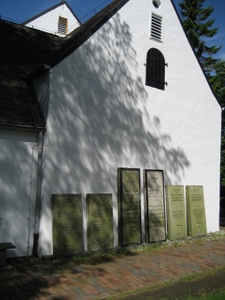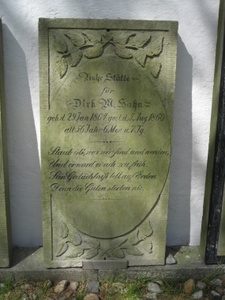Extract from 'Hahndorf and Its Academy' by Dr F.J.H. Blaess

 Captain Dirk Meinetz Hahn was born on 28 January 1804 at Westerland, on the Island of Sylt, then under Danish rule. In his Diary he says that he seriously thought of studying theology, but yielding to his father's wishes he became a sailor. At the age of 15 (1819), he had his first taste of life at sea on the 'Leitium' under Captain Dokker, but illness sent him home after seven weeks at sea. In 1820 he again joined the crew of the 'Leitium' and spent three years on the ship, trading mainly with Mediterranean ports. In 1823 he transferred to the 'Dido' (Captain Schmitt) and made his first voyage to America. From 1824 to 1833 he sailed on the 'Neptunus' under Captain Felix, from 1826 on as second mate. The 'Neptunus' was wrecked off the Dutch coast in August 1833. In 1827 he had made one unhappy trip on the 'Alwine'. In 1836 he was engaged as first mate on the 'Zebra' under Captain Stelting. When the latter died at Havana in the West Indies, Hahn was appointed to take the ship home to Altona. Here the owner, Mr Dale, engaged him as captain. On the 'Zebra' he made several voyages to North America with emigrants, also a trip to Bahia in South America, where his ship was caught up in a civil war and delayed with serious danger to itself and its captain. In the same year (1838) the 'Zebra' was chartered by Sloman & Co. to transport Lutheran emigrants to South Australia.
Captain Dirk Meinetz Hahn was born on 28 January 1804 at Westerland, on the Island of Sylt, then under Danish rule. In his Diary he says that he seriously thought of studying theology, but yielding to his father's wishes he became a sailor. At the age of 15 (1819), he had his first taste of life at sea on the 'Leitium' under Captain Dokker, but illness sent him home after seven weeks at sea. In 1820 he again joined the crew of the 'Leitium' and spent three years on the ship, trading mainly with Mediterranean ports. In 1823 he transferred to the 'Dido' (Captain Schmitt) and made his first voyage to America. From 1824 to 1833 he sailed on the 'Neptunus' under Captain Felix, from 1826 on as second mate. The 'Neptunus' was wrecked off the Dutch coast in August 1833. In 1827 he had made one unhappy trip on the 'Alwine'. In 1836 he was engaged as first mate on the 'Zebra' under Captain Stelting. When the latter died at Havana in the West Indies, Hahn was appointed to take the ship home to Altona. Here the owner, Mr Dale, engaged him as captain. On the 'Zebra' he made several voyages to North America with emigrants, also a trip to Bahia in South America, where his ship was caught up in a civil war and delayed with serious danger to itself and its captain. In the same year (1838) the 'Zebra' was chartered by Sloman & Co. to transport Lutheran emigrants to South Australia.
These Lutherans came from the eastern provinces of Prussia and were emigrating to escape the religious persecution they suffered because of their staunch Lutheran convictions and their refusal to join the Prussian king's Union Church. On 8 June 1838, they had embarked on river barges at Tschicherzig and then had travelled down the Oder, along connecting canals, and down the Elbe to Hamburg, where they boarded the 'Zebra' on 29 July. On 12 August they, 106 adults and 91 children, had left Hamburg. After a voyage of 129 days, the 'Zebra' reached Holdfast Bay, 28 December 1838, but on account of low water, did not reach Port Adelaide until 2 January 1839. Captain Hahn had become deeply concerned about the welfare of his passengers and during his stay in Adelaide exerted himself to procure for them land for a settlement and means of earning their livelihood.
He left South Australian shores on 14 February 1839 for Batavia and for the return voyage to Altona. Here the 'Zebra' was laid up for repairs. In 1841 he took command of the 'Apollo' on a voyage to South America. From 1842 to 1852 he was in charge of the 'Zodiacus', trading mainly with the West Indies. After thirty-one years at sea, he retired to spend his remaining days with his family at Westerland on Sylt. On 24 December 1831, he had married Hedwig Jens Nicolaison. His family consisted of one son and three daughters. He died on 13 August 1860.
Translation of Article 'Kapitan der Nachstenliebe' by Wolkgang Wegner ('Horzu' - German Weekly Magazine)
It was the year 1838, and Altona belonged still to Denmark. In the harbour the 3-masted 'Zebra' was being loaded. Provisions were to last 6 months - for a journey to the end of the world: to Adelaide in South Australia. Thirty four year old Captain Dirk Meinertz Hahn from Westerland had the command. Both his mates came from the neighbouring village of Keitum: Boy Dierksen and Ingwer Lorenz Petersen.
 Captain Hann's headstone, St Niels Church, Westerland, SyltOn 28th July the passengers went on board: 35 families, altogether 199 persons. They were fugitives, Old Lutherans from Silesia and Brandenburg. Heavy-hearted they decided on emigration, because they had had to suffer many years of persecution in Prussia because of their faith.
Captain Hann's headstone, St Niels Church, Westerland, SyltOn 28th July the passengers went on board: 35 families, altogether 199 persons. They were fugitives, Old Lutherans from Silesia and Brandenburg. Heavy-hearted they decided on emigration, because they had had to suffer many years of persecution in Prussia because of their faith.
"They were very religious", Captain Hahn describes the passengers in his journal. "An address (service) was held on deck morning(s) and evening(s) and prayers and singing, their song (singing) sounded very beautiful over harbour and town."
Hahn felt sympathy for his charges (protegees), who were so different from other emigrants he had taken on earlier voyages to America. Much gentler, more helpless, full of vehement hope for the future.
On the 12th August the 'Zebra' untied the ropes. On the shore of the Elbe stood countless people, because this was something New: the first departure of a non-English ship with German migrants to South Australia.
It was a hard journey. A dozen passengers died of typhus; as by a miracle the others were not infected. A storm east of the Cape of Good Hope shredded the 'Zebra' of five sails within a few minutes. They were mended by day and night shifts.
On 2nd January the ship ran (entered) into the harbour of Adelaide. At last after 84 days no land had been more (welcomingly) seen.
Captain Hahn's contract had been fulfilled. Yet instead of setting sail, he concerned himself further with his passengers. In the first place, he the trouble to lease land for them near Port Adelaide. By chance he came to know a Mr Dutton, who offered him 100 acres of land. The captain visited the land, and himself worked out a contract. With this the basis of subsistence for the Immigrants was assured.
But Hahn helped further. He travelled from place to place, cleared (smoothed) difficulties with the authorities on the way, 'cut down' prejudices against new comers. He was even successful in obtaining advances for future harvest returns (products) and in return to buy work tools and equipment. From ship's captain he had turned into Speaker and Leader for the Immigrants. So then they unanimously decided to name their new settlement Hahndorf.
Attempts to persuade the captain into staying, all to no avail (very loose translation!). When his charges (protegees) had their houses and fields, he considered his mission fulfilled, and sailed back to Altona. Australia never saw him again.
Hahndorf operates still today as a German smalltown. In the brewery (hotel?) there is German beer, and once a year a 'Schutzenfest (shooting match/festival). On the shop signs there are German names. In the middle of the town there is (erected) a memorial to the Captain.
Dirk Meinertz Hahn died in 1860. His grave in Sylt has long since been leveled, but the (head)stone leans on the wall of the St Niels Church in Westerland. The people of Hahndorf in distant Australia would subscribe to the epitaph on it:
Dust it is, what we are and will be,
And he (turned) became it, Oh! too soon;
But his memory lives on earth,
For his good works never die.
Information Related to Captain Hahn by Janis Haynes
On her trip in 2023 to Europe, Janis Haynes visited Captain Hahn's birthplace related to her 'Zebra Project' and obtained the following information:
[Janis - add your information here and change the above two lines as appropriate - Tony]


